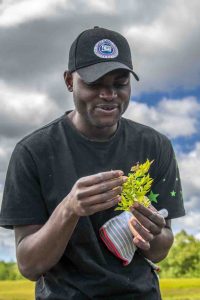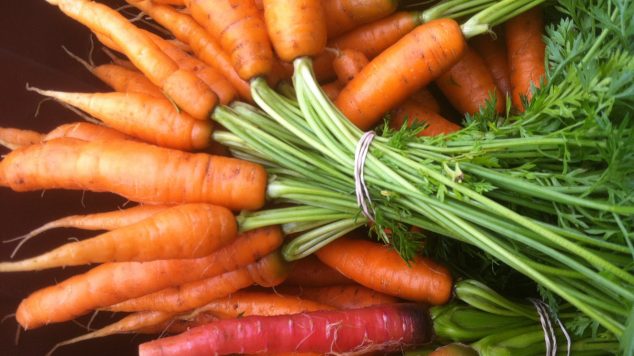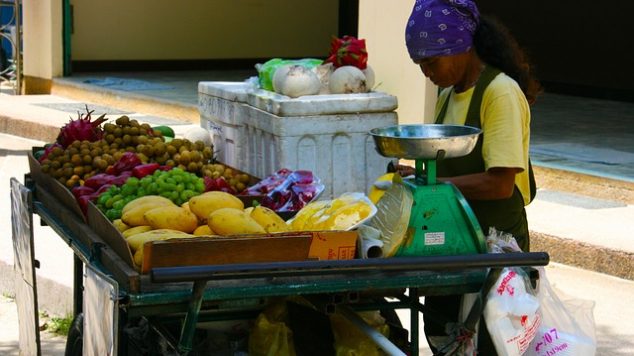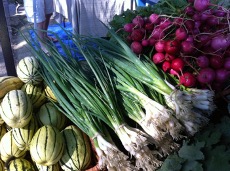B.S. Degree in Sustainable Food Systems
The program offers five concentrations and the opportunity to customize your own concentration:
- Climate Change and Food Systems focuses on how climate change affects and is affected by food systems, and how we can both use agriculture to mitigate environmental change while simultaneously adapting to it. Skills acquired will be highly sought after in a range of sectors including agricultural production, processing, distribution, municipal and community planning.
- Food Processing and Innovation encompasses the technical aspects of food science, while addressing the policy and cultural environments in which food science is practiced. Students will develop skills in entrepreneurship, commercialization, innovative business practices, and be able to apply these skills to new food product development and marketing.
- Justice, Equity, and Community Development allows students to become well versed in elements of policy, economics, and culture that lead to unequal and unjust social outcomes. Students will develop the skills they need to change these outcomes in their communities and future organizations. Career options can include directing programs that favorably impact community development in the U.S.
- Leadership and Management allows students to become well versed in the ethics of leadership and management, and learn how to apply these ethical standards to business and community development as they pertain to food systems. Coursework will train students to be communicators, to be knowledgeable about world cultures, and aware of policies that affect food domestically and internationally.
- Plant and Animal Production Systems allows students to learn about integrated crop and livestock systems at local, regional, national, and global scales. Critical analysis of these agricultural systems will instruct students about the most promising methods to decrease the ecological harm while contributing to vibrant food production. This concentration provides the opportunity to study both animal and crop production, and equips students for future careers in farming, agricultural advising, research, and policy.
- Individualized Concentration in Sustainable Food Systems permits students to develop their own individualized concentration in Sustainable Food Systems. Working with a faculty mentor, the student will be able to choose within the broad selection of courses available within the degree. Students who wish to pursue this option will have a specific set of skills unique for their chosen career path.
The B.S. degree in Sustainable Food Systems explores the  interconnected activities from production to consumption of food or generation of food waste, the people involved, and all factors that influence these activities or are influenced by them. The study of food systems is highly impacted by issues of sustainability, social justice, environmental policy, and community development. Food Systems studies allow students to develop complex reasoning skills and practical applications of knowledge to solve socioecological problems.
interconnected activities from production to consumption of food or generation of food waste, the people involved, and all factors that influence these activities or are influenced by them. The study of food systems is highly impacted by issues of sustainability, social justice, environmental policy, and community development. Food Systems studies allow students to develop complex reasoning skills and practical applications of knowledge to solve socioecological problems.
The program offers students the opportunity to gain knowledge and skills in:
- Plant and soil sciences
- Food science & human nutrition
- Animal & veterinary sciences
- Social & natural sciences
- Communication & leadership
Program Goals and Learning Outcomes
Program Goals:
1. Students completing the program in Sustainable Food Systems will demonstrate strong written, oral and interpersonal communication skills appropriate for an entry-level professional in food systems.
2. Students completing the program will be able to apply basic knowledge and skills in the area of sustainable food systems to practical, real-world settings as appropriate for an entry-level professional in food systems.
3. Students will be successful in obtaining careers in food systems.
Program Learning Outcomes:
After successful completion of the program students will be able to:
- Describe and analyze the complex components and functions of food systems and the interactions between them.
-
- Critically analyze components of the food system and design innovative strategies to address problems of supply, equitable access, resilience to climate stress and human wellbeing, among others.
- Describe public health and other policies, which affect food and nutrition issues globally.
- Recommend policy or course of action in response to problems with the food system.
-
- Develop all analyses and recommendations, relating to food systems, based on credible, evidence-based information and sources.
-
- Explain crop and livestock production in our current food system.
- Assess the environmental factors on food availability.
-
- Communicate professionally and clearly using a variety of media and approaches.


For more information contact:
Eileen Molloy (207.581.3121, Eileen.molloy@maine.edu)
Apply to UMaine
Associated Faculty
-

Timothy Bowden
Associate Professor of Aquaculture
207.581.2772
-

Stephanie Burnett
Associate Professor of Horticulture
207.581.2937
-

Mary Ellen Camire
Professor of Food Science and Human Nutrition
207.581.1627
-

-

Jianjun (Jay) Hao
Associate Professor of Plant Pathology
207.581.2564
-

Sue Ishaq
Assistant Professor of Animal and Veterinary Sciences
207.581.2770
-

Dorothy J. Klimis-Zacas
Professor of Clinical Nutrition
207.581.3124
-

Jade McNamara
Assistant Professor of Human Nutrition
207-581-4895
-

Eileen Molloy
Director of the Didactic Program in Nutrition and Dietetics (DP) and Undergraduate Program Coordinator, and Lecturer in Human Nutrition
207.581.3121
-

Jennifer J. Perry
Associate Professor of Food Microbiology
207.581.2940
-

Bryan Peterson
Interim Director & Associate Professor of Environmental Horticulture
207.581.2918
-

Juan Romero
Associate Professor of Animal Nutrition
207.581.2925
-

Rachel E. Schattman
Assistant Professor of Sustainable Agriculture
207-581-2913
-

Denise I. Skonberg
Professor of Food Science
207.581.1639
-

Kate Yerxa
Extension Professor, EFNEP Coordinator
207.581.3109

